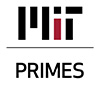 MIT PRIMES: How to Apply
MIT PRIMES: How to Apply
This page provides instructions for applying to MIT PRIMES, a research program for students living within driving distance from Boston. To apply to PRIMES-USA, a nationwide research program for sophomores and juniors living outside Greater Boston, see How to Apply to PRIMES-USA page. To apply to PRIMES Circle, a math enrichment program for local high school students, see How to Apply to PRIMES Circle page. Students residing outside the U.S. (including those attending an online school in the U.S.) are welcome to participate in CrowdMath. For more information about MIT PRIMES, see MIT PRIMES program details page .
The deadline for receiving applications for the 2026 cycle was December 1, 2025. All PRIMES-2026 admissions decisions were announced on January 28. We are unable to answer individual inquiries due to the large volume of applications. An application link for the 2027 cycle will appear on this page in September 2026.
Eligibility
High school
juniors
and
sophomores
(including home schooled) residing in the United States are eligible. Local students (living within driving distance from Boston) and non-local students apply through the same online portal. Local students will be meeting with their mentors in person; non-local will communicate via teleconferencing.
Local students interested in participating in math reading groups should apply to PRIMES Circle. One may apply to MIT PRIMES and PRIMES Circle at the same time; just note this on both applications. Such applications would be considered for MIT PRIMES first, and then for PRIMES Circle.
Students residing outside the U.S. (including those attending an online school in the U.S.) are welcome to participate in
CrowdMath.
Since 2025, MIT PRIMES has narrowed its focus to Math and Computational Biology. There will be no new admissions to Computer Science. We intend to expand research offerings in applied mathematics to accommodate students with interests in theoretical computer science or mathematical biology. We strongly encourage our colleagues in EECS and other MIT departments to set up PRIMES-like programs in their departments and would be happy to provide advice and share our experience.
It is not required but preferable that the applicant meets at least one of these criteria:
- USAMO or USAJMO qualifier;
- grade A for a college-level proof-based math course (online courses included);
- participation in a summer math program , such as Canada/USA MathCamp , AwesomeMath , HCSSiM , MathILy , PROMYS , Ross Program , or SUMaC , with a letter of recommendation from a counselor;
- a letter of recommendation from a college professor of mathematics.
Preparation
We suggest a list of recommended readings as a preparation for entering PRIMES and as a background for further research. You may find it useful to consult previous years' problem sets and solutions.
- 2013 problems and solutions
- 2014 problems and solutions
- 2015 problems and solutions
- 2016 problems and solutions
-
2017 problems
and
solutions
Note : See the summary of student answers to the 2017 open-ended question. This problem gave rise to the CrowdMath project (joint with the Art of Problem Solving) - 2018 problems and solutions
- 2019 problems and solutions
- 2020 problems and solutions
- 2021 problems and solutions
- 2022 problems and solutions
- 2023 problems and solutions
- 2024 problems and solutions
Why It Makes No Sense to Cheat
PRIMES expects its participants to adhere to MIT rules and standards for honesty and integrity in academic studies. As a result, any cases of plagiarism, unauthorized collaboration, cheating, or facilitating academic dishonesty during the application process or during the work at PRIMES may result in immediate disqualification from the program, at the sole discretion of PRIMES. In addition, PRIMES reserves the right to notify a participant's parents, schools, and/or recommenders in the event it determines that a participant did not adhere to these expectations. For explanation of these expectations, see What is Academic Integrity?
Moreover, even if someone gets into PRIMES by cheating, it would immediately become apparent that their background is weaker than expected, and they are not ready for research. This would prompt an additional investigation with serious consequences. By trying to get into PRIMES by cheating, students run very serious risks of exposing their weak background and damaging their college admissions prospects.
Contact
With questions, contact PRIMES Program Director Slava Gerovitch at
